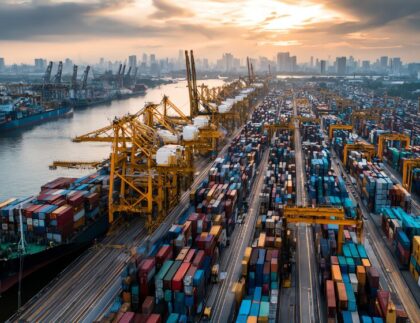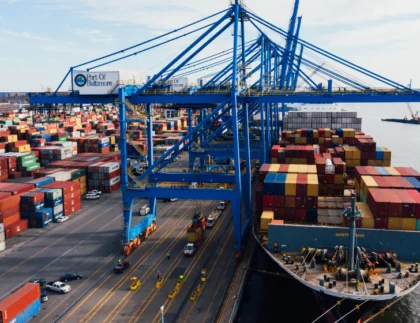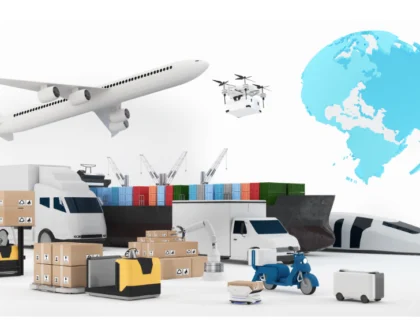
Reducing Costs and Increasing Efficiency
Efficiency and cost are value cores in the competitive freight forwarding business. Modern fleet management, power systems, etc., are being employed by companies to achieve operation, cost savings, and throughput increases. Transportation companies can better meet customer demands and manoeuvre on these platform devices in a volatile marketplace.
Understanding Fleet Management in Freight Forwarding
Fleet management involves a wide range of techniques and processes for optimizing the performance of vehicles and mobile and asset units in transport. Vehicle tracking, route planning, maintenance planning, fuel management, and compliance control are some of the responsibilities of freight forwarders.
The most senior-level fleet solution is driven by leading technologies (i.e., GPS, the Internet of Things (IoT), Artificial Intelligence (AI), big data analytics, and so on). But to provide us with real-time information to direct decision-making.

Key Challenges in Freight Forwarding Operations
Freight forwarding companies face several challenges in their daily operations. Rising fuel costs significantly affect operating costs, and compliance with government regulations and safety requirements is bureaucratic and time-consuming. Unscheduled periodic services/failures lead to schedule (i.e., time) delays and increased cost, while poorly defined routes lead to excessive time and fuel wastage.
In addition, there is a need to respond to the growing customer demand for faster and more transparent means of delivery, and, as a result, there is pressure on the company to fulfil customer requests. Modern fleet management systems are a response to the issues raised in this chapter by providing concrete novel applications and infrastructure.
Components of Advanced Fleet Management Solutions
Using real-time position-based GPS-based tracking, precise and detailed vehicle track-and-location information is extracted. As a result, they are further utilized to enhance transparency, protect vehicle thefts and provide customers with more consistent and real-time delivery information.
Vehicle route optimisation, by way of generative/recursive algorithms (AI) and machine learning, finds the best route to follow, thereby saving fuel and time and taking into account traffic, weather and road closures. Predictive maintenance, made possible by the Internet of Things (IoT) sensors, continuously monitors and keeps vehicles in good condition in real-time, reduces unplanned downtime, extends their usable life and prevents costly maintenance procedures.
Fuel management systems track fuel use to identify inefficiency and behaviours that cause poor fuel use while incentivising sustainable practices by tracking carbon dioxide emissions. Driver behaviour monitoring tracks driving behaviour to provide safety and effectiveness, with instances of errors in driving behaviour that lead to hard braking or speeding being converted into manager warnings, as are situations that encourage efficient driving behaviour to be encouraged.
Regulatory compliance tools automate the maintenance of the recordkeeping of regulatory requirements, such as Hours of Service rules, by ensuring the record is up to date and editable conveniently.

Benefits of Advanced Fleet Management for Freight Forwarders
High-level fleet management functionality provides a wealth of data from which real cost-savings can be made through optimisation, which produces fuel efficiency through route optimisation, as well as through prevention of expensive breakdowns through predictive maintenance and from unnecessary downtime thanks to asset-wise utilisation.
These technologies are used to keep operations efficient through improved scheduling, automation of as much of this human control as possible and technologically empowered data-driven direction of resource utilisation. Additional safety and regulatory compliance is also attained by driver behaviour monitoring, adherence to safety standards, and properly maintained vehicles.
The other significant main effect of the first increase in satisfaction is that delivery accuracy and speed have the potential to be enhanced through the use of background real-time location updates, and with the level of service transparency heightened through means of increasingly accurate and speedy deliveries, these can lead to the development of customer trust as well as the long-term customer-provider relationship both through the service provider's confident message delivery to the customer and the service provider's interaction with the customer.
Furthermore, these methods are green by minimising fuel use, reducing greenhouse gas emissions, routing, and using electric/hybrid vehicles.
Real-World Applications
Significant freight forwarders have implemented the subsequent generation fleet management by embedding it into their business model for efficiency improvement. For example, an international logistics company launched an IoT-based, smart-tracking system and an AI-based routing system. It achieved a 20% fuel cost reduction and a 30% improvement in on-time delivery performance.
On similar lines, a local freight forwarder used predictive maintenance software and reduced downtime by 40%, yielding significant cost savings and enhancing reliability.
Future Trends in Fleet Management
The future of logistics is still riding on the emergence of fleet management solutions. Autonomous vehicles, such as self-tracking (self-driving) trucks, will transform long-haul logistics to reduce labour costs and improve vehicle efficiency. The electrification of fleets is already in progress because of environmental regulations and government incentives. Because of its secure and auditable record storage, blockchain can be integrated to enhance supply chain operation efficiency.
Advanced telematics uses real-time data and predictive analysis combined with sophisticated decision-making of higher-level complexity and integration with artificial intelligence and machine learning, leading to machine learning and intelligent automation of practice and track-based optimization of fleet management practice.
Implementing Advanced Fleet Management Solutions

Fleet management technology is to be progressively implemented only if the freight forwarders, before doing so, identify what they want to achieve and design, for so doing, such technology about the issues that must be solved and the goals that must be attained. The following method must be performed to decide which features will be prioritized concerning business needs.
Choosing an appropriate technology partner is by far the most significant single factor, and, for businesses, vendor comparison is also a competence and scalability (i.e., the capacity to provide a highly extensible and extendable solution to customer requirements).
Conclusion
Fleet management solutions at a high end no longer have a place only in the optionality for freight forwarders. Still, they are a compulsory part of achieving cost savings and operational efficiency. With the help of the latest technologies such as GPS, predictive maintenance and Artificial Intelligence (AI) based analysis, companies are currently free of traditional limitations.
They are achieving new objectives in service provision. The market evolution makes it possible to implement these solutions and points to greener and more innovative freight forward practices.











